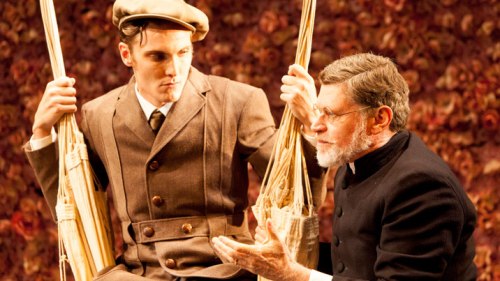Shaw Assures Success: STC’s Production of Mrs Warren’s Profession
In 1893 Mrs Warren’s Profession was unable to attain a license for performance and was to remain unperformed for the next twenty years. So scandalous was its subject matter. By today’s standards it is pretty tame, and you almost wish they’d just say the word ‘prostitute’. Nevertheless, Sydney Theatre Company’s production of the Shavian classic still has impact.
Kitty Warren is a woman with an infamous past and a daughter, Vivian, whose linage is sketchy to say the least. Kitty keeps her ignorant however, with an expensive education and a comfortable lifestyle – although the pair a virtual strangers to each other. Upon their reunion it isn’t long before the truth comes out, sparking conflict as they differ over the other’s lifestyle choice. As such, the relationship and indeed their identities are called into question.
The crux of the play lies here. In her note, director Sarah Giles states that the play is essentially about the feminist question (obviously). For a Victorian audience this may have been true, but for today’s audience, the play is about something a little different. By and large it comes down to a question of duty and principle. Mother and daughter respectively sacrifice one for the other – it is a question of how far one is willing to tip the scale. Ultimately, Vivian and Kitty are both right and wrong in their conclusions, and the genius of Shaw allows you to see the world from both perspectives. It is a tossup as to whose side you’ll come down on. Audiences will undoubtedly disagree as to whose, but that’s what makes it so true to life. Perhaps Giles needed to unpack the text a little more to get to this universal reading rather than falling back on the safety of feminism. Having said that, the young director made a deft job of bringing the cast together as an ensemble.
To begin with, Helen Thomson is a very powerful performer. She commanded the stage and committed every inch to the role of Mrs Warren. There is little to criticise except for the decision to drop the ‘posh’ accent when in scenes alone with Vivian. By consciously reverting to the character’s original cockney roots for lengthy periods, she loses the credibility that is otherwise afforded by her performance. Yet director Giles should be criticised here too, as it is just as much a directorial failing (though it is called for in the script, some discretion as to the extent of its use should have been exercised). During these scenes Thomson also drops her middle class mannerisms, (wrongly) to enhance the ‘from nothing’ aspect of her character – it is only slightly more forgivable. For all this however, Thomson delivers the cheeky, sly, calculating mother well, and is especially powerful in her final speech.
Lizzie Schebesta (Vivian Warren) looked every bit the Austin heroine. Overall, Schebesta made a good fist of the role. Yet the character required a sharper energy, rather than one that was simply ‘oppositional’. The young Miss Warren was also physically restrictive, doing little more than pacing when flustered or emotional. For the two faults mentioned, she just fell short of making us believe that she unreservedly rejected love.
Simon Burke played Praed – the attractive middle-aged friend of Mrs Warren. In this role, Burke was cute and light. He fluttered around the stage and played the audience well, almost too well in sections, though he mostly got away with it. Burke is obviously experienced with ensemble work. He sat well within the frame of his character and produced a lovely performance.
Martin Jacobs was superb as Sir George Croft; he is a very impressive performer. Beautiful stage skill (always audible) and impeccable presence – he makes it look seamless. Like Burke, probably more so, his experience allows for a remarkably controlled performance. Beautifully observed, Jacobs understands that people only really ‘get angry’ about personal convictions – as such he delivers the cope de grace perfectly – as measured and controlled as the rest of his performance.
The young Frank Gardner was played by Eamon Farren, and he packs a real punch. Farren has a wonderful energy which should have been matched by his co-star, though perhaps it was more a question of conviction – for he had this as well. Also to Farren’s credit was his freedom of movement – he allowed himself to physically explore the character, making for some very creative stage craft.
Drew Forsythe was highly competent in the role of Samuel Gardner – in suffering the disadvantage of an obvious plot device; he was a joy to watch and worked with what he had – though occasionally forgoing the truth of the character in order to achieve a gimmick. Luckily it worked.
Giles has offered the Sydney theatre scene yet another minimalist production. Granted, it does work, but one hopes there is something different coming in the pipeline for audiences. Having said that, the music composed by Max Lyandvert perfectly suited the play and the backdrop of silk roses (a nod to Victorian excess and sentimentality without miring the action) were visually stunning and seemed to shift and alter in appearance with the assistance of Nigel Levings’ lighting design. Costumes were period but striped of ostentation.
In the end this is a very fine production, but in all probability, it was always going to be. Is the STC capable of something with more punch or edge? We’d like to think so and we’d like to see them try. Shaw and Giles do however deliver the goods on what is to be congratulated as a solid production.
Mrs Warren’s Profession runs from 19 February – 6 April, with an extended season from 4 July – 20 July. For more information:
http://www.sydneytheatre.com.au/what’s-on/productions/2013/mrs-warrens-profession.aspx












